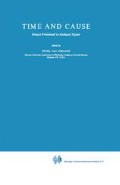Abstract
Richard Taylor has made valuable contributions to the discussion of many central questions of philosophy. Of particular interest to me has been his work on the philosophy of time. I agree with some of his conclusions and disagree with others, but whether his conclusions are true or false his arguments are always challenging. I find Taylor’s arguments for similarities between time and space particularly good, as in his fine papers ‘Spatial and Temporal Analogies and the Concept of Identity’1 and ‘Moving About in Time’.2 On the other hand I do not agree with certain views which Taylor has held about an alleged difference between time and space, namely that there is a passage or movement of time, an irreducible pure becoming. I refer here in particular to Chapter 8 of the second edition of Taylor’s Metaphysics. 3 In this paper I intend to argue for a contrary view, namely that the alleged passage of time or pure becoming is an illusion. Certainly we feel that time flows, but I want to say (contrary to Taylor) that this feeling arises out of metaphysical confusion. It is easier, in my opinion, to argue for the illusoriness of temporal passage or of pure becoming than it is to give a plausible diagnosis of the cause of the illusion, but I shall try to make some suggestions about this toward the end of this paper. In defending the ideas of passage and pure becoming Taylor has ranged himself alongside many other philosophers, and I shall be concerned with this tradition in general, and not only with Taylor’s own particular version of it. It should be noted that Taylor is himself quite aware of the sorts of arguments which I shall put forward, but he is more impressed than I am by the apparent ‘datum’, as he calls it, of our experience of time as apparently involving a pure becoming or passage.
Access this chapter
Tax calculation will be finalised at checkout
Purchases are for personal use only
Preview
Unable to display preview. Download preview PDF.
Notes
Journal of Philosophy 52 (1955), 599–612.
Philosophical Quarterly 9 (1959), 289–301.
Metaphysics,2nd ed. (rev.), Prentice-Hall, Englewood Cliffs, N. J., 1974.
F. Cajori (ed.), Sir Isaac Newton’s Mathematical Principles of Natural Philosophy and His System of the World,University of California Press, Berkeley, 1960. See the `Scholium to the Definitions’.
For example, see Sir Arthur Eddington, Space, Time and Gravitation,Harper: New York, 1959, p. 51.
See A. N. Prior, `Time After Time’, Mind 67 (1958), 244–246.
See C. D. Broad, Scientific Thought,Routledge and Kegan Paul, London, 1949, Chap. 2; and Richard Taylor, Metaphysics,Chap. 8.
Op. cit.
For the semantics of indexical expressions, see Donald Davidson, `Truth and Meaning’, Synthese 17 (1967), 304–323, especially the remarks on pp. 319–320.
Metaphysics,p. 83 ff.
On this point see W. V. Quine, Philosophy of Logic, Prentice-Hall, Englewood Cliffs, N. J., 1970, pp. 63–64.
C. D. Broad, An Examination of McTaggart’s Philosophy,Cambridge University Press, London, 1938, Vol. 2. Pt. 1.
Philosophy of Science 43 (1976), 337–362. I apologize to McCall if I have misunderstood him, as is quite likely in view of my own inability to make sense of theories of time flow. At least I am trying to say what his theory comes to, to the extent that I can make sense of it to myself.
See Bryce DeWitt and Neill Graham (eds.), The Many-Worlds Interpretation of Quantum Mechanics,Princeton University Press, Princeton, N. J., 1973. For some cautions see Brian Skyrms, `Possible Worlds, Physics and Metaphysics’, Philosophical Studies 30 (1976), 323–332.
See McCall, op. cit.,p. 343, bottom diagram.
Ibid.,p. 348.
Op. cit.
See Broad’s reply to his critics, in P. A. Schilpp (ed.), The Philosophy of C. D. Broad,Tudor, New York, 1959, especially pp. 766–767.
David K. Lewis, Counterfactuals, Blackwell, Oxford, 1973, pp. 84–91.
Metaphysics,p. 86.
J. J. C. Smart, `The River of Time’, Mind 58 (1949), 483–494.
The alternative title of Sir Walter Scott’s Waverley.
Metaphysics,p. 87 ff.
Recently Ferrel Christensen, in his paper `The Source of the River of Time’, Ratio 18 (1976), 131–144, has defended a linguistic explanation of the metaphor of passage. He holds that predicates like `past’ and `future’ are parasitic on adverbial ones and treats tenses as adverbs; that there are in the ordinary sense no temporal relations, so that `and then’ does not signify such a relation. This seems to me to be wrong. I think that ordinary adverbs should be understood in terms of predicates of events, as has been suggested by Donald Davidson. Tenses should be handled differently, by means of a tenseless metalanguage — see Donald Davidson, op. cit. `And then’ should be handled by ordinary conjunction and the predicate `earlier than’. Nevertheless, even if I am right about these points of disagreement with Christensen, the article is of interest for the way in which he claims to trace `the river of time’ to a linguistic source.
So that instead of `here’, `now’, `you’ and `will be’, for example, they would have `near this utterance’, `simultaneous with this utterance’, `the person to whom this utterance is addressed’ and `is later than this utterance’.
Adolf Grünbaum, ‘Carnap’s Views on the Foundations of Geometry’, in P. A. Schilpp (ed.), The Philosophy of Rudolf Carnap, Open Court, La Salle, Ill., 1963, p. 663. See also Adolf Grünbaum, Philosophical Problems of Space and Time, 2 nd ed. (enlarged), Reidel, Dordrecht, 1973, p. 325.
On these points, see Robert E. Ornstein, On the Experience of Time,Penguin, Harmondsworth, 1969, Chap. 4.
Author information
Authors and Affiliations
Editor information
Editors and Affiliations
Rights and permissions
Copyright information
© 1980 Springer Science+Business Media Dordrecht
About this chapter
Cite this chapter
Smart, J.J.C. (1980). Time and Becoming. In: Van Inwagen, P. (eds) Time and Cause. Philosophical Studies Series in Philosophy, vol 19. Springer, Dordrecht. https://doi.org/10.1007/978-94-017-3528-5_1
Download citation
DOI: https://doi.org/10.1007/978-94-017-3528-5_1
Publisher Name: Springer, Dordrecht
Print ISBN: 978-90-481-8358-6
Online ISBN: 978-94-017-3528-5
eBook Packages: Springer Book Archive

